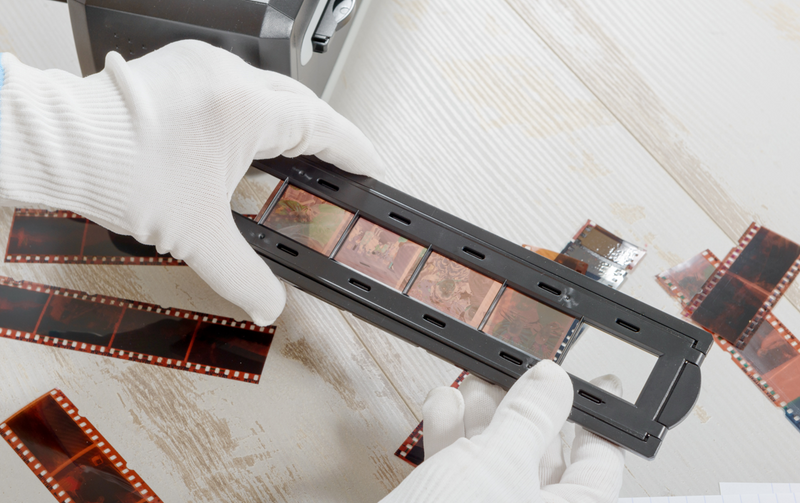
With advances in technology, our memories have undergone a transformative shift from tangible photographs to digital pixels. While the sentimentality attached to physical photography prints is undeniable, the vulnerability of the original negatives to wear, tear, and environmental factors poses a serious threat to our photographic legacies. Enter digitization”a contemporary solution that not only safeguards our memories but enhances their accessibility, shareability, and longevity. Let's explore the compelling advantages for digitizing your photographic negatives, exploring the myriad benefits that extend beyond mere preservation.
Analog Vulnerability
Photographic negatives, those strips of film that bear the latent image of captured moments, are often stored in boxes, bags, or envelopes. They're carefully tucked away as if to shield them from the ravages of time. However, even with the best intentions, analog negatives are susceptible to degradation over time. Factors such as exposure to light, fluctuations in temperature and humidity, and simple wear and tear can lead to faded colors, discoloration, or, in extreme cases, irreparable damage.
Preserving Photo Negatives
Digitizing your photographic negatives serves as a powerful antidote to these threats. By converting these analog treasures into digital files, you create a copy that remains immune to the physical deterioration that plagues traditional photography. Digital preservation ensures that the quality of your images remains intact, allowing you to protect and perpetuate your photographic legacy for generations to come.
Negatives Are Challenging
Picture this: a dusty attic, an old photo album, and the quest for a particular photograph. It's a scenario that many of us have experienced”a nostalgic journey through the printed photos of our past. Yet, the original photographic negatives are even harder to search. Without a light table, it's nearly impossible to find your special pictures by squinting into a photo negative. However, you'll get much higher quality preservation from digitizing the film negative than the photo printed on dubious quality paper.
Accessibility Redefined
Once digitized, your entire photo negative collection becomes a virtual gallery at your fingertips. No more rifling through boxes, bags, and envelopes. Digital files can be organized, tagged, and categorized with ease. Want to relive a family vacation or revisit a milestone celebration? A few clicks, and you're there. The convenience of digital access not only saves time but also enhances the overall enjoyment of your photographic legacy.
Sharing Beyond Borders
Photographic memories are not meant to be confined, either within the pages of an album or envelopes of negatives. Pictures yearn to be shared, to traverse distances and connect hearts. Digitizing your photographic negatives breaks down the barriers of physicality, allowing you to share your visual stories effortlessly with friends & family, irrespective of geographical constraints.
The Digital Solution
Digital files, like JPG images, can be shared through various mediums”email, social media, or cloud storage. Imagine sending a high-resolution image of your parents' wedding to a relative overseas or sharing childhood photos with a sibling who lives miles away. Digitization fosters a sense of connectivity, transforming your photographic legacy into a bridge that spans generations and geographies.
New Life into Old Memories
The passage of time can leave its mark on analog negatives, manifesting as scratches, dust, or other imperfections that diminish the visual appeal of your images. Digitization not only preserves your original photographs but also opens up a realm of possibilities for restoration and enhancement. Digital imaging software empowers you to repair scratches, remove dust particles, and enhance colors with precision.
Future-Proofing Your Pictures
The devices of the past locked consumers into using proprietary analog formats. Now, digitizing your photographic negatives turns the pictures into portable files accessible on every type of modern device. It's a strategic move to future-proof your memories against the loss of these outdated devices.
Adapting to the Digital Landscape
Digital files are adaptable”they can be easily migrated to new storage devices, updated to meet emerging standards, and seamlessly integrated into evolving technologies. This adaptability ensures that your photographic legacy remains accessible and relevant, irrespective of changes in storage mediums or viewing platforms. By digitizing your negatives, you secure your memories against the risk of obsolescence, allowing future generations to continue enjoying and sharing your visual narratives.
DIY Negative Digitizing
For those who enjoy a hands-on approach, DIY scanning is a viable option. High-resolution flatbed scanners or dedicated film scanners can be used to digitize individual negatives. While this method provides control over the process, it can be time-consuming and frustrating to practice until you get it right.
Professional Scanning Services
For a more efficient and comprehensive solution, professional scanning services are a popular choice. These services use specialized equipment to scan large batches of negatives, ensuring high-quality results with minimal effort on your part. While there is a cost associated with this service, the time saved and the quality achieved often outweigh the investment. The cost for professional digitization of most collections is typically less than purchasing a DIY scanner.
Negatives to Digital Before It's Too Late
Please consider preserving your treasured photographic negatives before the media degrades forever. You'll breathe easy once your pictures are digitally preserved. Embrace the journey from analog to digital, and let the nostalgic stories within your photo negatives continue to unfold for generations to come.
Select a box to get started.
Pack whatever fits... we'll sort it all.
Simply pay unit digitizing prices.
















